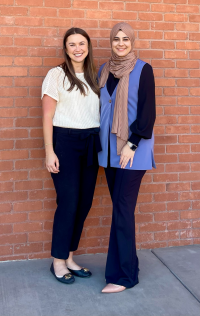ASU Bio and Society Researchers Publish Article about Creating More-Inclusive Spaces for Muslim Students

By: Center for Biology and Society
When Tasneem Mohammed, a Palestinian-American Muslim graduate student, entered Dr. Katelyn (Katey) Cooper’s biology education research lab in fall of 2020, both women had questions about how Tasneem’s Islamic religion would potentially conflict with the culture of academia.
“I remember Googling and trying to predict what challenges Tasneem might encounter in the lab, given that she is a devout Muslim,” Dr. Cooper recalls. “Would she need a space to pray? Can she interact with lab members of the opposite gender?”
At the same time, Tasneem questioned what she had gotten herself into when she was asked to prepare a list of conferences that the lab might be interested in attending.
“In my culture, I do not travel out of state without a mahram, defined as a male relative,” Tasneem says. “So, I just assumed I would not be able to travel to conferences and I worried that Katey would be disappointed or that it would disqualify me from doing research in the lab. So, I emailed her about my concern.”
The pair sat down to have what would be the first of many conversations about the conflict, or lack thereof, between the Islamic religion and the culture of academia: They identified a quiet room where Tasneem could pray, discussed how traveling with a mahram could be possible, and even debunked some of Katey’s misconceptions, such as the fact that Tasneem can certainly interact with members of the opposite gender, although physical contact is not permitted.
Simultaneously, Bio and Society alumna and current Assistant Professor at Middle Tennessee State University, Dr. Elizabeth Barnes, was tackling similar questions with her PhD Muslim student, Rahmi Aini. Drs. Cooper and Barnes, who completed their PhDs together at ASU, recognized their similar situation.
“We both voiced how much we wish we would have had a guide to creating a more inclusive lab space for our Muslim students before they arrived, as opposed to having to figure everything out as we went along,” Dr. Cooper says. The pair, along with their PhD students, decided to pen an essay describing how to create more-inclusive lab spaces for Muslim research mentees in the sciences.
The essay was published this summer in CBE Life Sciences Education. It outlines four potential challenges that Muslim research mentees may experience related to their religious practices: prayer obligations, observing Islamic holidays, abstaining from prohibited food and drink, and etiquettes of Islamic modesty and upholding integrity. The essay proposes an array of potential accommodations that mentors can make to create a more inclusive lab environment for Muslim research mentees, as well as highlights flexible aspects of Islam that may facilitate compromises between mentors and mentees.
“I never imagined I’d go from questioning whether I could be a Muslim woman in science to writing an essay about how to be more inclusive of Muslim research mentees,” Tasneem says. “I’m very grateful for a PhD program like Bio and Society that facilitated my entry into the Cooper Lab and that encourages me to bring my full identity to my PhD program.”
Tasneem just got back from presenting at her fifth out-of-state conference (always with her mahram) proving that neither religion nor academic aspirations need to be sacrificed.